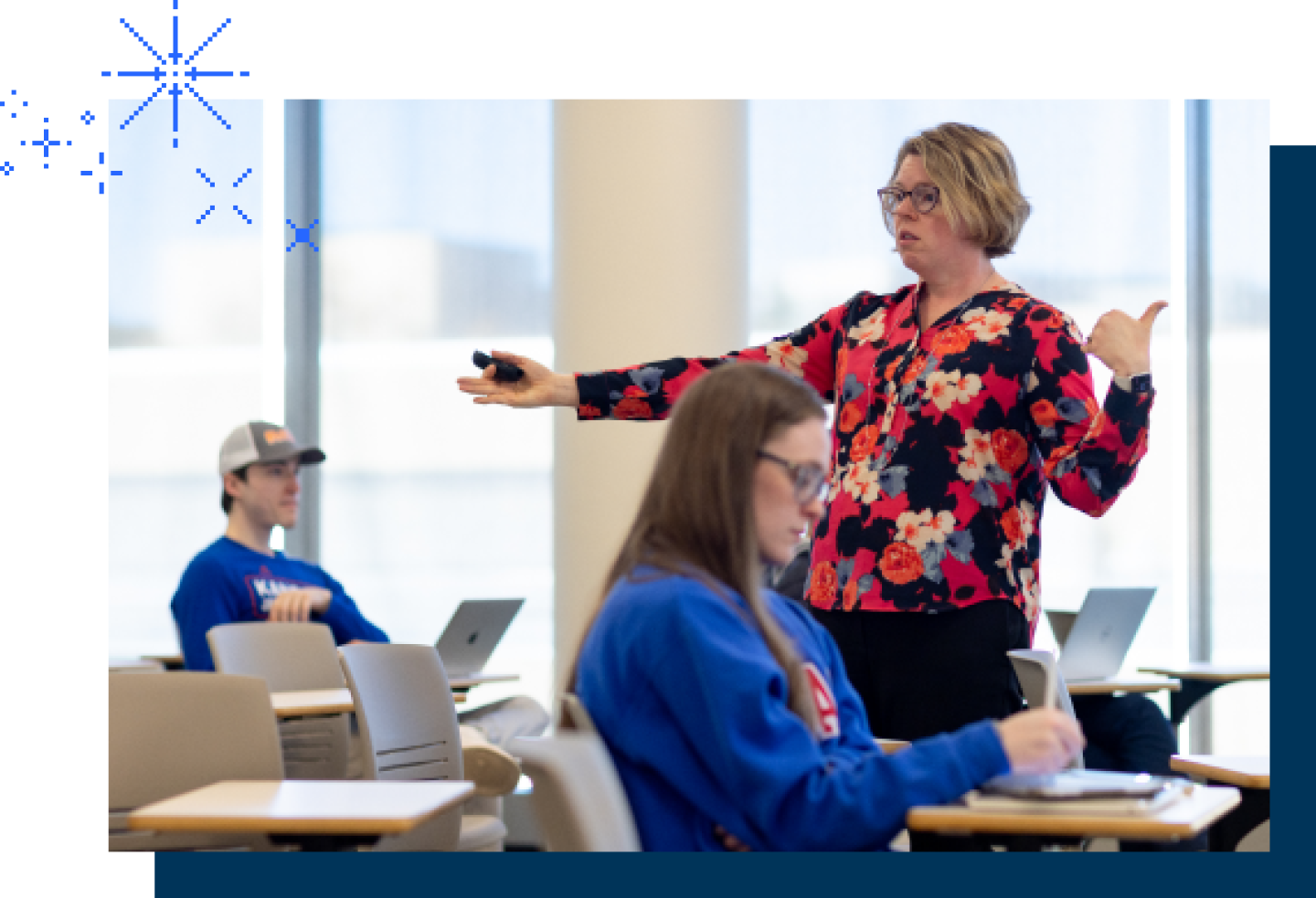Join KU’s legacy of educational excellence with a Master's in curriculum and instruction online
The University of Kansas School of Education and Human Sciences has empowered educators to transform teaching and learning since 1909. The online Master of Science in Education (M.S.E.) in Curriculum and Instruction* builds on that legacy, combining the excellence KU is known for with the flexibility working educators need.
Whether you're looking to enhance your classroom expertise, develop innovative curricula, or explore new horizons to apply your expertise, this program offers the comprehensive foundation you need to make a lasting impact. Here, you'll join a community of forward-thinking educators, each of whom brings unique experiences to the program. Together you’ll learn from faculty who are actively shaping the future of education through groundbreaking research and real-world application.
Curriculum
Classroom Environment
Admissions
*This program is an online Master of Science in Education (M.S.E.) degree in curriculum and instruction. It does not lead to initial or advanced teaching licensure. Prior teaching experience is not required but is strongly recommended.
Program Details
- 100% online with no campus visits required
- 10 courses (30 credit hours)
- 8-week courses for focused study
- Complete in as few as two years
- Accredited under NCATE/CAEP standards
- No GRE required for admission
Build expertise that transforms classrooms
Master’s in curriculum and instruction online
For licensed teachers expanding their skills
This comprehensive master's program empowers working educators to become instructional leaders through evidence-based curriculum development and innovative teaching strategies. You'll create practical tools for immediate classroom use while building the theoretical foundation needed for educational leadership roles.
What you’ll learn:
Master advanced instructional strategies and curriculum development principles that address diverse learning needs in today's classrooms. You'll explore multicultural education approaches, educational technology integration, and research-based methods for creating inclusive learning environments. The program emphasizes practical application, enabling you to design and implement innovative curricula while developing the leadership skills needed to drive educational change in your school or district.
Note: In order to enroll in this curriculum and instruction master’s program, a bachelor's degree is required.
Ideal for:
- Classroom teachers seeking instructional leadership roles
- Curriculum coordinators and department heads
- Educational consultants and instructional coaches
- Teachers pursuing salary advancement or career changes
- Educators wanting to specialize in curriculum development
- Professionals transitioning into educational training roles
- Teachers interested in pursuing doctoral studies later
Program highlights:
- Design curriculum and assessments you can implement immediately in your classroom
- Build a professional portfolio that showcases your growth as an educational innovator
- Develop expertise in cutting-edge instructional technologies and differentiated learning
Advance your skills, expand your impact
The University of Kansas online education programs are built for people who want to make a difference—in classrooms, schools, and communities. Whether you’re a teacher, administrator, parent, nonprofit professional, you’ll find programs that connect research to practice and provide tools you can put to use right away. With flexible online courses and dedicated faculty support, KU helps you grow your expertise while continuing the important work you’re already doing.
- ✓ 8-week focused courses
- ✓ Evidence-based, research-driven curriculum
- ✓ Practical skills you can apply immediately
- ✓ Top-ranked by the U.S. News & World Report*
*Retrieved on February 17, 2026, from usnews.com/education/online-education/university-of-kansas-155317
Complete the form below to receive more information about your selected program, straight to your inbox.
Online curriculum and instruction master’s: Course descriptions
KU’s master’s degree in curriculum and instruction is for current educators and teachers who want to learn more about effective instructional practices and curriculum development to make a difference. Here, you can read more about the courses available to those pursuing a master’s in curriculum and instruction online at the KU School of Education and Human Sciences. Each course listed is worth 3 credits.
Please note: Course list and sequence are subject to change.
C&T 709 Foundations of Curriculum and Instruction
C&T 807 Multicultural Education
C&T 806 Instructional Strategies & Models
ESPY 715 Understanding Research in Education
Students should expect to study much of this material in greater depth through additional coursework before being fully prepared to conduct independent research. However, this course should enhance their ability to locate, read, comprehend, and critically analyze research articles and reports. Topics in the course include quantitative and qualitative methods and designs, historical and descriptive research, and program evaluation.
C&T 803 Differentiating Curriculum & Instruction
C&T 874 Constructivist Learning Technologies
C&T 802 Curriculum Planning for Education Settings
C&T 770 Pedagogical Considerations in the 21st Century Classroom
C&T 801 Planning for School Improvement
C&T 890 Bridging Theory to Practice: Capstone Portfolio
The Jayhawk online learning experience
At KU, online learning doesn’t mean you’re on your own. KU’s virtual classrooms buzz with the same energy and collaboration you'd find on campus, creating an environment where meaningful connections flourish alongside academic growth.
Your classroom community
Step into virtual spaces where theory meets real-world experience. Your classmates bring diverse perspectives from classrooms across the country. This rich mix of experience creates dynamic discussions and opportunities to share practical solutions to today's teaching challenges.

Flexible yet engaging
The thoughtfully designed C&I master’s program fits the rhythms of a working professional’s life:
- Eight-week courses that align with your teaching schedule
- Asynchronous learning balanced with interactive group projects
- Live discussion sessions that work with your timeline
- Collaborative assignments that build your professional network
- Access to course materials 24/7
Personal support at every step
Your journey to becoming a more effective educator starts with the right guidance. Erica, your dedicated admissions outreach advisor, understand the unique challenges teachers face when pursuing graduate education. She'll help you understand how the program aligns with your teaching goals, guide you through the application process step by step, answer your questions about online learning at KU, and connect you with any other resources you need for success.

Make a lasting impact in education
Ready to join the next generation of educational leaders? KU's online education programs offer three starts per year, making it easier to begin your journey when the time is right for you.
- Based on a limited sample of self-reported data from alumni of the University of Kansas School of Education and Human Services online programs in education from graduating cohorts between 2021 and 2025.
- Retrieved on February 17, 2026, from usnews.com/education/online-education/education

